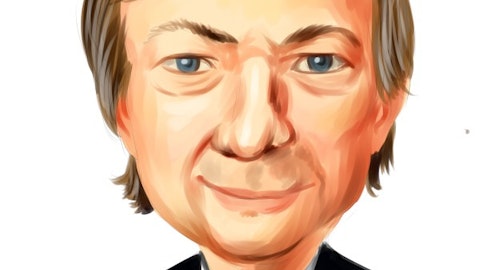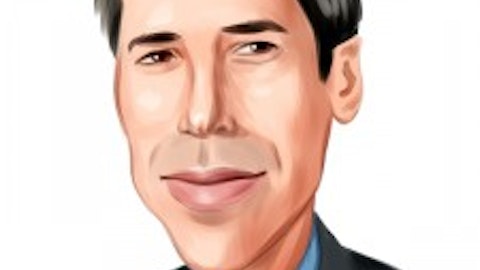In a conference call with investors following the first quarter of 2012, Michael Karsch of Karsch Capital Management expressed a bullish view towards eBay (EBAY), the $52 billion market cap online auction manager which also owns a number of subsidiaries including ticket site StubHub and online payments manager Paypal. Karsch had spent much of the first quarter increasing his fund’s stake in EBAY, and owned over 1 million shares at the end of March. In his commentary Karsch discussed the enormous potential for EBAY to use Paypal to bring “their success in online payments into the physical retail world…Home Depot, for example, now allows customers to use their PayPal cards at the point of purchase and thousands of small vendors, who are probably already eBay merchants, are now using PayPal in their smaller stores. I think you are going to see that grow a lot. To give you a sense of the opportunity set, a 2% penetration in the physical retail world for PayPal would be as much payment volume as all of PayPal today.” Up about 28% this year- and up 8% since the end of March as the S&P has lagged- getting into EBAY when Karsch did would have been a great decision. But does his advice still hold for investors?
Karsch is not the only hedge fund manager with a position in EBAY. Eton Park Capital, managed by Eric Mindich- who was the youngest partner in the history of Goldman Sachs while he was with the firm- owned 8.3 million shares (see Eton Park’s stock picks). The fund had increased its position over the course of 2011 before slightly reducing its exposure in 2012. However, it is still nearly 4% of Eton Park’s 13F portfolio. Steadfast Capital, a multi-billion hedge fund managed by Robert Pitts, was bullish enough on EBAY to buy 3.5 million shares of the company in the first three months of the year, a new position for the fund (see what else Steadfast Capital bought earlier this year).
EBAY’s first quarter results were excellent. The company increased its revenue by 29% over the first quarter of 2011, and increased its net income by 20%. EBAY experienced growth in both its major segments, Marketplaces and Payments, though its increase in operating income in the Payments segment- which includes the Paypal business- was particularly strong. If this fact is because of the trend that Karsch identified- increased penetration by Paypal in the retail payments market- then growth in Payments could begin to drive the business going forward and push the stock higher.
EBAY’s closest peer is Amazon (AMZN), which is one of the 10 most popular services stocks among hedge funds (see the entire list here). EBAY’s trailing P/E of 16 is a fairly reasonable. Though the company is not expected by analysts to grow their earnings this year, managers such as Karsch apparently feel differently and embracing higher earnings expectations would make the company look even cheaper. Amazon, meanwhile, has a P/E of over ten times this figure at 180 and even the growth expected from analysts only brings its forward P/E down to 85. Considering each company’s PEG ratio, which may account for Amazon’s longer-term growth plans, EBAY’s 1.26 still easily comes in as more appropriate for a value investment than AMZN’s 5.36. EBAY can also be compared to Google (GOOG), which has a slightly higher P/E of 17 but has been growing its earnings more rapidly, and is expected to continue this high growth in the near future. Google’s forward P/E is only about 12 and so it might make a better investment, unless investors believe that the market is not appropriately rewarding EBAY’s growth prospects.






